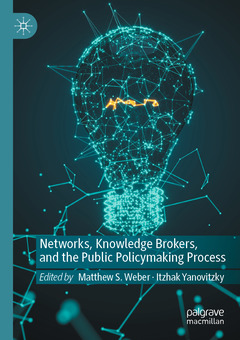Description
Networks, Knowledge Brokers, and the Public Policymaking Process, 1st ed. 2021
Coordinators: Weber Matthew S., Yanovitzky Itzhak
Language: English
Subjects for Networks, Knowledge Brokers, and the Public Policymaking...:
Publication date: 11-2022
396 p. · 14.8x21 cm · Paperback
Publication date: 11-2021
396 p. · 14.8x21 cm · Hardback
Description
/li>Contents
/li>Biography
/li>Comment
/li>
Social network analysis provides a meaningful lens for advancing a more nuanced understanding of the communication networks and practices that bring together policy advocates and practitioners in their day-to-day efforts to broker evidence into policymaking processes.
This book advances knowledge brokerage scholarship and methodology as applied to policymaking contexts, focusing on the ways in which knowledge and research are utilized, and go on to influence policy and practice decisions across domains, including communication, health and education. There is a growing recognition that knowledge brokers ? key intermediaries ? have an important role in calling attention to research evidence that can facilitate the successful implementation of evidence-informed policies and practices. The chapters in this volume focus explicitly on the history of knowledge brokerage research in these contexts and the frameworks and methodologies that bridge these disparate domains. The contributors to this volume offer useful typologies of knowledge brokerage and explicate the range of causal mechanisms that enable knowledge brokers? influence on policymaking. The work included in this volume responds to this emerging interest by comparing, assessing, and delineating social network approaches to knowledge brokerage across domains.
The book is a useful resource for students and scholars of social network analysis and policymaking, including in health, communication, public policy and education policy.
Chapter 1.Knowledge Brokers, Networks and the Policymaking Process (by Matthew S. Weber and Itzhak Yanovitzky).- Chapter 2. Disseminating Evidence to Policymakers: Accounting for Audience Heterogeneity (by Jonathan Purtle).- Chapter 3. “Being Important” or “Knowing the Important”: who is the best to influence policy? (by Kathryn Oliver).- Chapter 4. Integrating Connectionist and Structuralist Social Network Approaches to Understand Education Policy Networks: The Case of the Common Core State Standards and State-Provided Curricular Resources (by Emily M. Hodge, Susanna L. Benko and Serena J. Salloum).- Chapter 5. Measuring Issue Preferences, Idea Brokerage, and Research-Use in Policy Networks: A Case Study of the Policy Innovators in Education Network (by Joseph J. Ferrare, Sarah Galey-Horn, Lorien Jansy and Laura Carter-Stone).- Chapter 6. The Role of Brokers in Connecting Educational Leaders around Research Evidence (by Kara S. Finnigan, Alan J. Daly, Anita Caduff and Christina C. Leal).- Chapter 7. An Ego-Network Approach to Understanding Educator and School Ties to Research: From Basic Statistics to Profiles of Capacity (by Elizabeth N. Farley-Ripple and Ji-Young Yun).- Chapter 8. Mixing Network Analysis and Qualitative Approaches in Educational Practices (by Mariah Kornbluh).- Chapter 9. A Multi-Level Framework for Understanding Knowledge Sharing in Transnational Immigrant Networks (by Rosalyn Negrón, Linda Sprague-Martínez, Eduardo Siqueira and Cristina Brinkerhoff).- Chapter 10. Promoting healthy eating: A whole-of system approach leveraging social network brokers (by Kayla de la Haye, Sydney Miller and Thomas W. Valente).- Chapter 11. Brokerage-centrality conjugates for multi-level organizational field networks: Toward a blockchain implementation to enhance coordination of healthcare delivery (by Kayo Fujimoto, Camden J. Hallmark,Rebecca L. Mauldin, Jacky Kuo, Connor Smith, Natascha Del Vecchio, Lisa M. Kuhns, John A. Schneider and Peng Wang).- Chapter 12. Platformed Knowledge Brokerage in Education: Power and Possibilities ( by Jennifer A. Lawlor, J.W. Hammond, Carl Lagoze, Minh Huynh and Pamela Moss).- Chapter 13. Network approaches to misinformation evaluation and correction ( by Katherine Ognyanova).- Chapter 14. Closing the Theory-Research Gap in Knowledge Brokerage: Remaining Challenges and Emerging Opportunities ( byItzhak Yanovitzky and Matthew S. Weber).
Matthew Weber (Ph.D., University of Southern California) is Associate Professor of Communication at Rutgers University’s School of Communication & Information. Matthew is a computational social scientist and an expert on media ecosystems, organizational dynamics and the use of Big data in research. His research explores processes of organizational change and adaptation, with a focus on understanding how organizations navigate complex information ecosystems in order to develop evidence-informed policies and policymaking processes. Matthew’s work has been widely published in leading academic journals, as well as in the popular press, and is funded by grants from a number of federal agencies including the National Science Foundation.
Itzhak Yanovitzky (Ph.D., University of Pennsylvania) is Professor of Communication at Rutgers University’s School of Communication & Information. His program of research explores effective mechanisms for improving the dissemination and implementation of evidence-informed policies and practices and building the capacity of community organizations to communicate effectively about health and wellness issues. Dr. Yanovitzky is an expert in the area of behavior change, public policymaking and translational science, and is a member of the National Academies of Science, Engineering, and Medicine’s Standing Committee on Advancing Science Communication.




